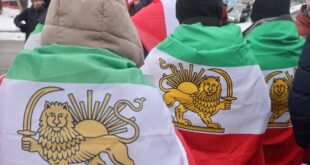TEHRAN (Fars News Agency)- The effort to sanction Iran in the UN Security Council was meant to showcase international unity against Tehran’s nuclear programs. But instead, the bitter four months of negotiations have highlighted a growing rift between Washington and Russia.
US and European diplomats involved in the negotiations say Russia delayed the vote, which is expected today, and worked hard to water down tough provisions that they had agreed earlier to support.
Russia, one of five countries on the Security Council with veto power, has opposed US-backed travel bans on Iranian officials involved in the country’s nuclear and missiles programs, as well as former US ambassador John R. Bolton’s push for sanctions on civilian nuclear technology needed for the Bushehr civilian reactor that Russia is building in Iran.
Russian diplomats expressed outrage in October when Britain, France, and Germany shared a proposed draft of the resolution with the United States before sharing it with Russia, according to two diplomats involved in the negotiations.
After a copy of the draft was leaked to The New York Times — and referred to as an American-backed proposal — negotiations slowed for weeks, they said.
Russian’s UN envoy, Vitaly Churkin , suggested that the United States and its European allies were at fault for the delay for pushing for sanctions in areas beyond weapons-producing activities.
“It has been a difficult process,” he told reporters Thursday.
The tense negotiations have taken place at a low point in US-Russian relations, analyst s say, and at a time of rising anti-American sentiment in Russia fueled by state-owned media.
“Officially, Mr. Bush and [ President Vladimir V.] Putin are friends, but the relations between the two countries are probably the worst they have been in five years,” said Aleksandr Grigoriev , editor in chief of Washington Profile, a project of the World Security Institute, a Washington think tank that follows news reports and public opinion in Russia.
In recent months, relations with Moscow have worsened with the high-profile assassination of Russian journalist Anna Politovskaya and the bizarre, fatal radiation poisoning of a Russian spy in London who accused Putin of ordering his killing.
Several US State Department officials have expressed frustration over the past four months with the former Cold War foe, calling the Russian attitude key to whether the United Nations can be effective in rolling back Iran’s nuclear program.
“Russians have an idea of a zero sum gain — that everything that helps the US hurts them,” said one senior Washington-based US official who was closely following the UN talks. He spoke on the condition of anonymity because he did not want to endanger the talks.
“If they continue that, then the multilateral efforts will go nowhere,” he said, adding that Washington would then have to resort to acting on its own.
The United States and its allies contend that Iran’s nuclear enrichment program is aimed at creating a weapon, but they have never presented any corroborative evidence or proof substantiating their claims. Iran insists its program is for civilian electric power generation. In May, Secretary of State Condoleezza Rice announced that she had struck an agreement with key partners to sanction Iran if it didn’t stop enriching uranium. The Security Council set a deadline of Aug. 31, but Iran refused to comply. Iran has faced no consequences because Security Council members have been struggling to agree on what measures to take.
And the debates among the permanent members of the UN Security Council all arise from the fact that Iran has never violated international, IAEA or NPT rules and regulations by enriching uranium. As a matter of fact, the International Atomic Energy Agency (IAEA) should have rendered extensive technical and financial aids to Iran as a signatory of the Non-Proliferation Treaty (NPT), which it never did. The reports presented by IAEA inspectors and Director General Mohammad ElBaradei after over 2500 man/day inspections of Iran’s nuclear facilities and installations have never mentioned anything about diversion of Iran from peaceful to military purposes. These reports have actually endorsed the peaceful and civilian nature of Iran’s nuclear activities.
Rice alluded on Thursday to her frustrations with the difficult negotiations. She said she was “satisfied” with the resolution, which threatens additional steps if Iran still fails to comply, but also said, “I think it’s been no secret that we would have preferred to have had this happen earlier.”
Michael Rubin , a former Pentagon adviser on Iran and current scholar at the American Enterprise Institute, a Washington- think tank, said the drawn-out talks highlighted the international community’s disunity and Russia’s desire to undermine the United States.
 Eurasia Press & News
Eurasia Press & News



